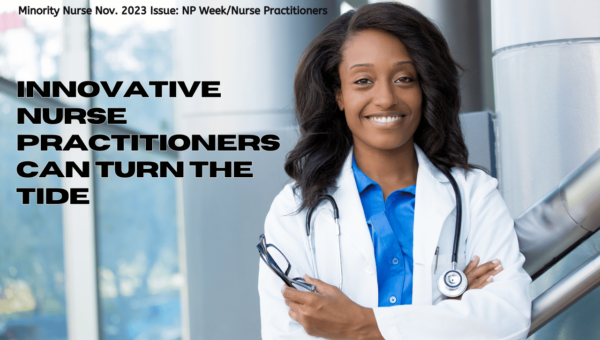Nurse practitioners have been valuable members of the healthcare ecosystem for decades. As providers with increasing practice autonomy, NPs fill significant healthcare delivery gaps.
With a growing shortage of primary care physicians, the need for NPs could not be more dire. When NPs approach patient care innovatively, everyone benefits from their creativity.
NP Innovation is Here
Coming from a background steeped in nursing’s more holistic view of patient care
, nurse practitioners’ outlook can differ significantly from physicians’ perspectives.“Nurse Practitioners do what nurses do best — educate and listen to their patients,” states Dr. Mykale Elbe, DNP, APRN, FNP-BC, Assistant Dean of Nursing and Associate Professor at the Catherine McAuley School of Nursing of Maryville University. “Patients report that nurse practitioners listen well and educate them more on their disease and treatment plan.”
She affirms that nurses are responding to the needs they perceive.
“Nurses are returning to obtain their NP degree to serve their communities due to the need for more providers. Most nurses write about the need for primary care or mental health services in admissions essays. With nurses being on the front lines and seeing the needs of their patients, they are being motivated to advance their education and make a difference.”
Claire Afua Ellerbrock, DNP, APRN, PMHNP-BC, is a psychiatric mental health nurse practitioner who supports other PMHNPs in managing their well-being. She sees the NP’s point of view as key to creating effective provider-patient collaboration.
“Nurse practitioners’ approach to the provider-patient relationship is unique, with its foundation rooted in compassion, collaboration, and trust,” states Dr. Ellerbrock. “As nurses first, NPs excel in building trust with patients, and this trust significantly enhances healthcare delivery.”
Dr. Ellerbrock elaborates on how NPs can provide quality care that matches or exceeds that of physicians. “A 2015 systematic review of ten randomized controlled trials found that NPs ‘demonstrated equal or better outcomes than physician groups for physiologic measures, patient satisfaction, and cost.’ Our ability to foster trust is the cornerstone of these positive outcomes.”
And in terms of innovation, Dr. Ellerbrock is enthused by what she sees.
I’m witnessing exciting innovations in NP entrepreneurship. Nurse practitioners are identifying unmet needs and creatively addressing them, whether it’s through innovative delivery models or educational initiatives for NPs. For example, Justin Allen from The Elite NP has developed a business that assists other NPs in establishing their practices and ensuring high-quality patient care.”
Dr. Ellerbrock continues, “Additionally, my online course business, Stress Free Psych NP, is dedicated to empowering psychiatric and family practice NPs to diagnose and treat mental health patients with greater confidence. I firmly believe that entrepreneurship is the driving force behind advancing healthcare.”
Other NP innovators dot the country with their unique practice models.
Dr. Joanne Patterson, DNP, PMHNP-BC, CIMHP of Atlanta, has created the first-ever tiny house psychiatric clinic on wheels. She can deliver on-site mental health care for businesses, corporations, and schools and reach patients who might otherwise lack the ability to get a fixed office location. Dr. Patterson’s innovation extends to being licensed to treat patients virtually in Maryland, Nevada, Florida, and Washington, D.C., which increases the number of patients who can benefit from her holistic orientation and broadens the market for her business.
Josie Tate, MSN, CRNP, FNP-C, is a nurse practitioner who provides career guidance for other NPs. She feels that NPs are thinking innovatively and creating careers that work for them.
“NPs are leveraging their skills to become intrapreneurs and entrepreneurs within the healthcare industry,” shares Ms. Tate.
“Healthcare organizations benefit from NPs being highly experienced personally and professionally, “adds Ms. Tate. “We’ve created blended and flexible schedules and salary structures that challenge the norms. Whether having two PRN roles, taking locum tenens assignments, or 1099 contract positions, we provide optimal care while living our vision of a liberated life.”
Turning the Tide for a Bright Future
When it comes to the future, many NPs see a limitless horizon. Nurse practitioners can focus on adult gerontology (AGNP), the entire lifespan (FNP), mental health (PMHNP), pediatrics (PNP), midwifery (CNM), and other specialties, and certain roles can be pursued through educational pathways focused on either acute care or primary care. NPs can also earn post-master certificates in other disciplines.
Additionally, full practice authority is slowly growing despite resistance by medical groups who may feel threatened by NPs’ success and growing market share.
Ms. Tate states, “I envision the future for nurse practitioners as the powerhouse of healthcare, especially with an increased number of states gaining full practice authority. Primary care for underserved populations will be accessible thanks largely in part to nurse practitioners.”
Dr. Ellerbrock concurs. “I see the future of the NP role expanding to encompass full practice authority in all states, effectively bridging gaps in primary care and reaching underserved populations.”
She continues, “These gaps in care are not only persisting but also expanding, both in the United States and globally. By 2030, the demand for healthcare workers worldwide is projected to rise to 80 million, while the supply of healthcare workers is expected to reach only 65 million over the same period. Granting NPs the authority to practice to their fullest extent across the country positions us well to meet these growing needs.”
When it comes to embracing this rising tide, Ms. Tate adds, “Nurse practitioners need an empowering mindset to guide and direct their career paths. This mindset will build on their strengths and open opportunities throughout healthcare.”
Dr. Elbe is encouraged by how today’s NPs are being educated. “We’re ensuring that we’re preparing NP students around access to care, understanding social determinants of health, and the role NPs can play in improving outcomes, promoting health, and preventing disease cost-effectively.”
There’s no denying that nurse practitioners are reaping the rewards of decades of hard work, advocacy, and professional advancement. From entrepreneurship and a business mindset to innovative patient care models, NPs will continue to be an essential cornerstone of keeping the American healthcare system serving patients with increased access to care and the compassionate, skilled providers to treat them.




